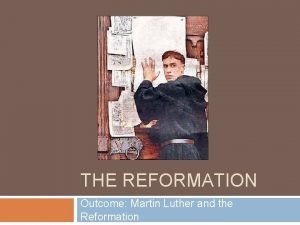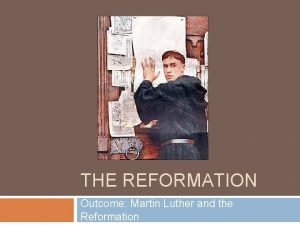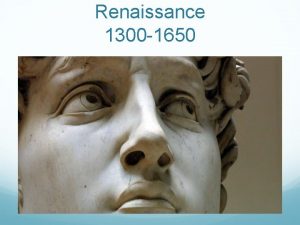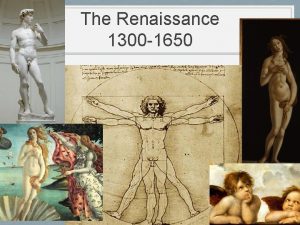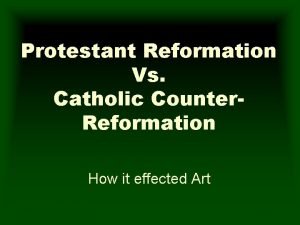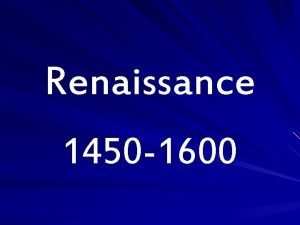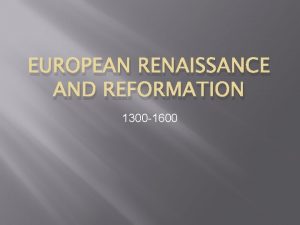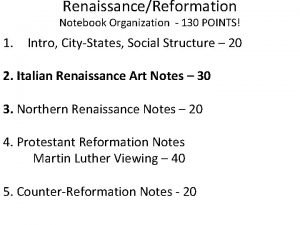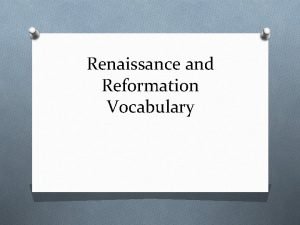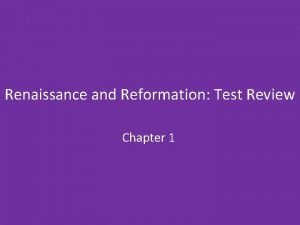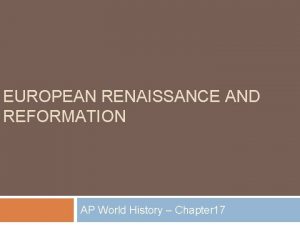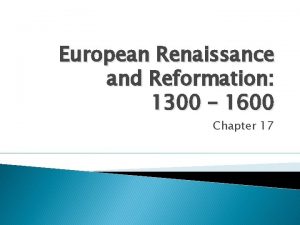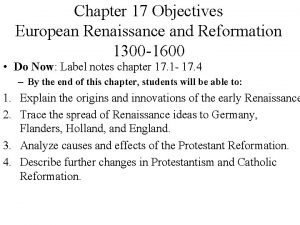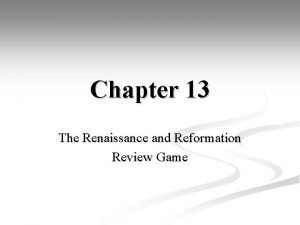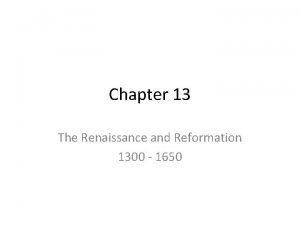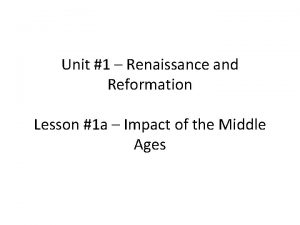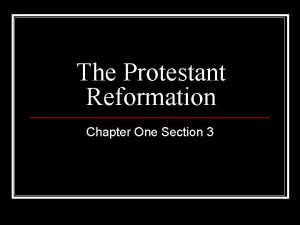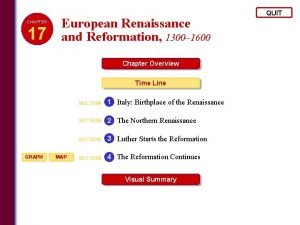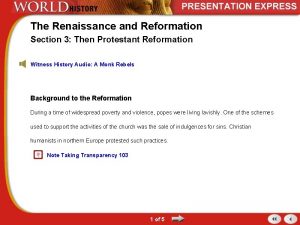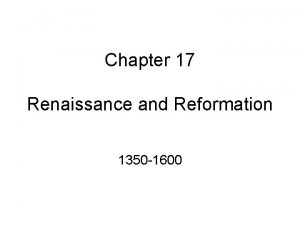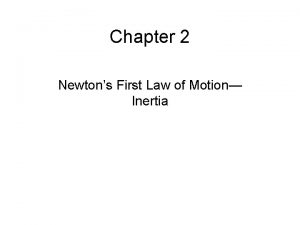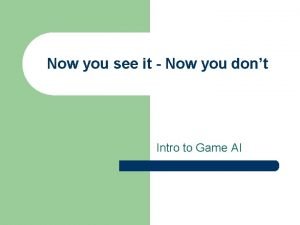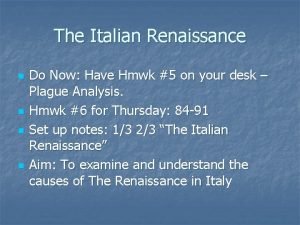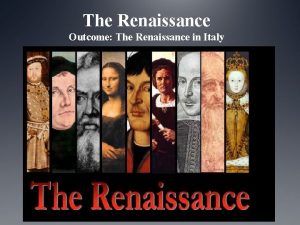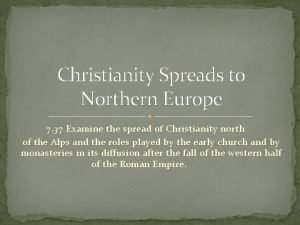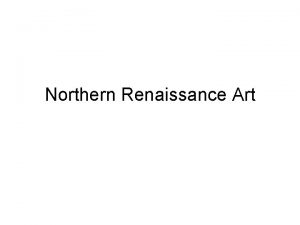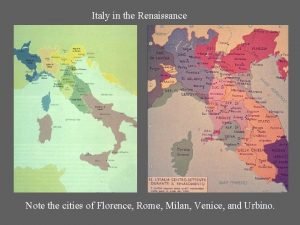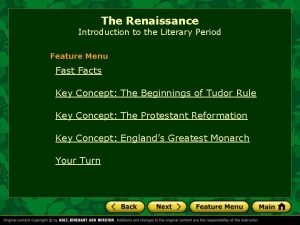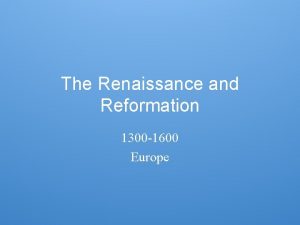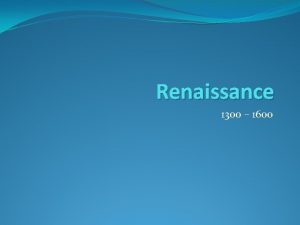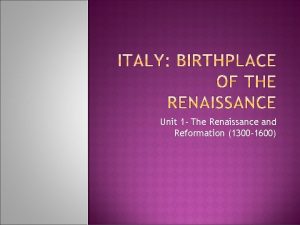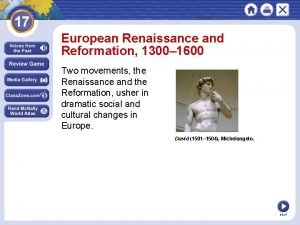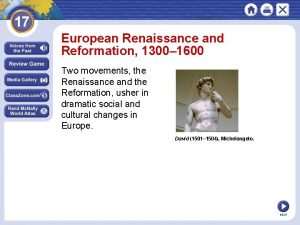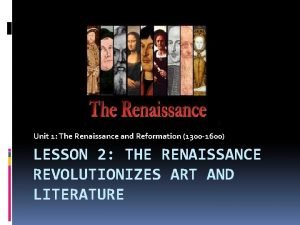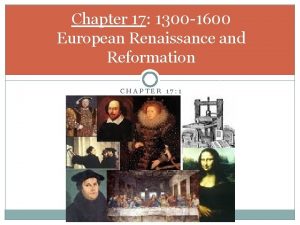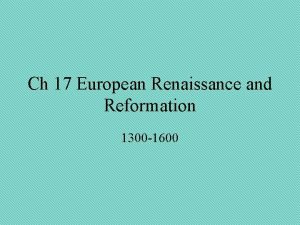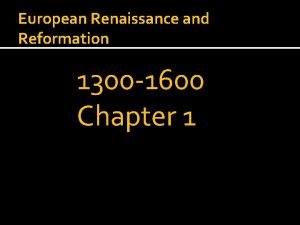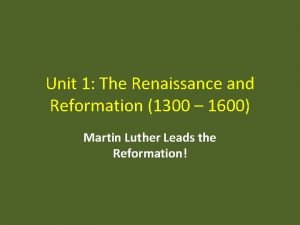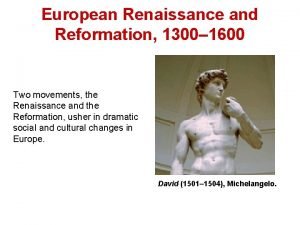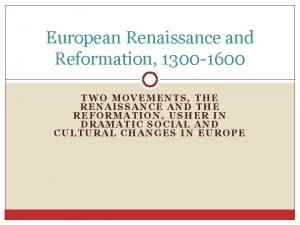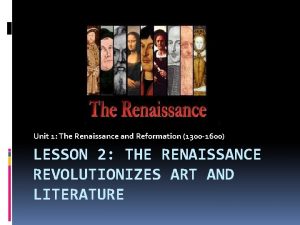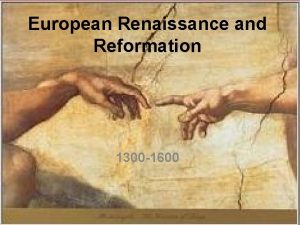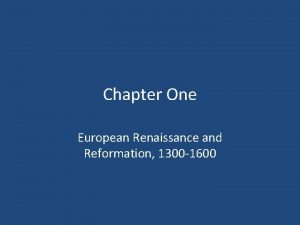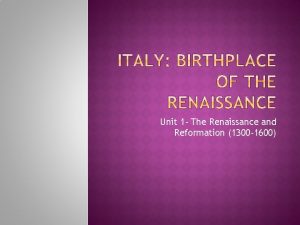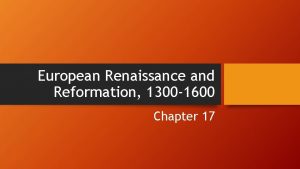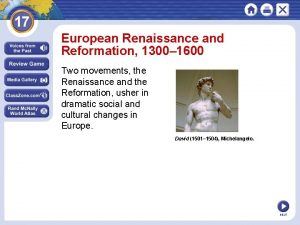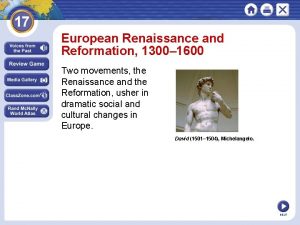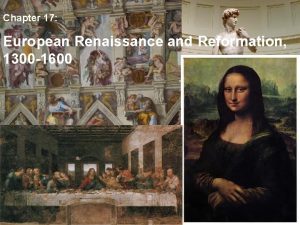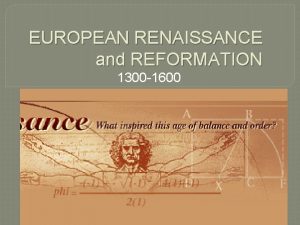Renaissance and Reformation 1300 1600 Do Now 1































- Slides: 31

Renaissance and Reformation 1300 -1600

Do Now • 1. Where did the Renaissance begin? • 2. Name 2 of the famous works of the Renaissance and who created them? • 3. Why was it called the period of “Rebirth”?

• Between 1300 and 1600 the Western world was transformed. An extraordinary wave of artistic and cultural innovation shattered medieval society and brought European culture reluctantly into the modern era.

Renaissance—”Rebirth” n Renaissance, " French for "rebirth, " perfectly describes the intellectual and economic changes that occurred in Europe from the fourteenth through the sixteenth centuries. n The Renaissance was an age in which artistic, social, scientific, and political thought turned in new directions.


Italian Renaissance • Italy= the birthplace of the Renaissance • Florence and Venice • Why would the Renaissance begin here? ?

Why Italy? ? ? 1. Geography- Italy’s coastal cities were centers of trade ***Trade = Cultural Diffusion 1. 2. Italy was a historical center of culture (roman empire) Wealthy merchant class developed who supported the arts

Humanism • The Renaissance began in Italian towns and cities • Humanism developed, which meant a renewed interest in Greek and Roman classics • Humanists set up schools so people could study classic works of literature • Focused on the individual (people)

Perspective • The technique of representing threedimensional objects and depth relationships on a two-dimensional surface

1. What are the characteristics of the painting on the left? 2. What are the characteristics of the painting on the right? 3. What time period probably produced the on the left …. the on the right?

Most famous Renaissance artists Leonardo da Vinci Michelangelo Rafael Donatello

• Leonardo da Vinci • Famous Works: Mona Lisa and The Last Supper • Made plans for planes, cars, submarines, and tanks, which actually would function. • “The Renaissance Man”: A person that had a well rounded education. Had many different trades and was extremely talented.

http: //www. youtube. com/watch? v=9 Bfq. SM 84 e. K 0

• . Michelangelo Works of Art: Ceiling of the Sistine Chapel, David, and the emotional Pieta



• Donatello born in 1386, died in 1486. • Famous for many things including the youthful sculpture of David in Florence. • Donatello was one of the earliest artists working with the idea of perspective.

• Raphael • In his painting The School of Athens, he reflected the classical influence upon Renaissance art, but he also paid tribute to the men who inspired him by using the faces of da Vinci, Bramante and Michelangelo as philosophers participating in the debate

The School of Athens – Raphael, 1510 -11 Da Vinci Raphael Michelangelo


Writers of the Renaissance • Shakespeare: Othello, Hamlet, Romeo and Juliet, and Julius Caesar • Chaucer: Canterbury Tales • Miguel de Cervantes: Don Quixote

Niccolo Machiavelli : “The Prince” “The ends justify the means” • -The reason for this is a small pamphlet he wrote called The Prince was to gain influence with the ruling Medici family in Florence. -His ideas were used to justify the new absolutist governments of the 1500’s • Right now, however, he is associated with corrupt, totalitarian government.

The Medici Family • Patrons of the arts The Medici are the first princely dynasty to win their status not by warfare, marriage or inheritance but through commerce. They came to Florence in the 12 th century. During the next two centuries the family, amassed a fortune through banking and trade.

Florence Under the Medici The Medici Palace Medici Chapel

Renaissance Architecture- revival of Greek and Roman styles


Characteristics of the Renaissance (CHIP) • Classicism: rebirth of the Roman and Greek architecture and art. • Humanism: focus on the individual and not on the religious themes • Individualism: Focus on the individual • Perspective: creating a three-dimensional object on a two dimensional surface

Do Now • What was the most important effect of the Renaissance? Why?

The Protestant Reformation • Church becoming increasingly involved in world affairs throughout the Middle Ages • Renaissance rulers maintained lavish lifestyle • Church increased feed for services such as marriages and baptism

Martin Luther • German Monk and Professor of Theology • Triggered a revolt against the Churches abuse • 95 Theses • Arguments against indulgences • Luther argued that indulgences had no basis in the Bible, that the Pope had no authority to release souls from purgatory, and the Christians could be saved only through faith

Luther versus the Church • The Church wanted Martin Luther to recant, or take back his 95 Theses • Luther refused, and developed more radical doctrines (ideas) • He started urging Christians to reject the authority of Rome • The Pope excommunicated Luther • Luther became an outlaw, making it a crime for anyone in the empire to give him food or shelter
 Time of rebirth
Time of rebirth The reformation outcome martin luther and the reformation
The reformation outcome martin luther and the reformation The reformation outcome martin luther and the reformation
The reformation outcome martin luther and the reformation Renaissance timeline 1300 to 1650
Renaissance timeline 1300 to 1650 Borgia and medici timeline
Borgia and medici timeline Catholic reformation vs counter reformation
Catholic reformation vs counter reformation Renaissance 1450 to 1600
Renaissance 1450 to 1600 Who wrote praise of folly
Who wrote praise of folly Topic 4 the renaissance and reformation
Topic 4 the renaissance and reformation Renaissance and reformation interactive notebook
Renaissance and reformation interactive notebook Renaissance and reformation vocabulary
Renaissance and reformation vocabulary Renaissance and reformation review
Renaissance and reformation review European renaissance and reformation answer key
European renaissance and reformation answer key Chapter 17 european renaissance and reformation
Chapter 17 european renaissance and reformation European renaissance and reformation chapter 17
European renaissance and reformation chapter 17 Chapter 13 the renaissance and reformation
Chapter 13 the renaissance and reformation Chapter 13 renaissance and reformation
Chapter 13 renaissance and reformation Unit 1 renaissance and reformation
Unit 1 renaissance and reformation Protestant reformation worksheet answer key
Protestant reformation worksheet answer key European renaissance and reformation chapter 1 answer key
European renaissance and reformation chapter 1 answer key Chapter 12 renaissance and reformation
Chapter 12 renaissance and reformation The renaissance and reformation section 3 quiz
The renaissance and reformation section 3 quiz Chapter 17 renaissance and reformation
Chapter 17 renaissance and reformation When burl and paul stand on the scaffold
When burl and paul stand on the scaffold Now i see it now you don't
Now i see it now you don't A renaissance man now
A renaissance man now Outcome of renaissance
Outcome of renaissance Italian renaissance vs northern renaissance venn diagram
Italian renaissance vs northern renaissance venn diagram The renaissance outcome renaissance painters/sculptors
The renaissance outcome renaissance painters/sculptors Northern renaissance art characteristics
Northern renaissance art characteristics Renaissance vs high renaissance
Renaissance vs high renaissance The renaissance introduction to the renaissance answer key
The renaissance introduction to the renaissance answer key

